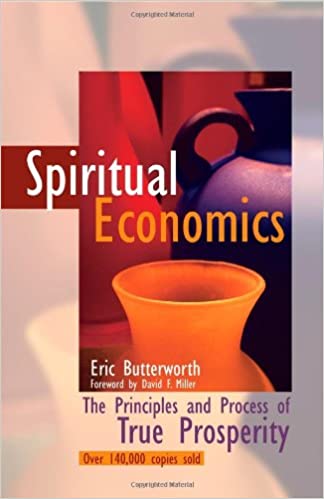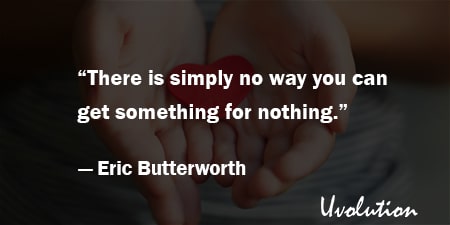Spiritual Economics by Eric Butterworth Summary
The Book in 1 Sentences
Spiritual Economics: The Principles and Process of True Prosperity
“The goal should not be to make money or acquire things, but to achieve the consciousness through which the substance will flow forth when and as you need it.” ~ Eric Butterworth
10 BIG Ideas
1. Prosperity = 'to go forward hopefully'
2. Affluence = ‘an abundant flow’
Spiritual Economics Book Summary
1. Prosperity = 'to go forward hopefully'
“Prosperity comes from the Latin root which literally translates: ‘according to hope’ or ‘to go forward hopefully.’ Thus it is not so much a condition in life as it is an attitude toward life.
The truly prosperous person is what psychologist Rollo May calls ‘the fully functioning person.’”
2. Affluence = ‘an abundant flow’
“The word affluence is an overworked word in our time, usually implying cars and houses and baubles of all kinds. Its literal meaning is ‘an abundant flow,’ and not things at all.
When we are consciously centered in the universal flow, we experience inner direction and the unfoldment of creative activity. Things come too, but prosperity is not just having things. It is the consciousness that attracts things.”
Henry David Thoreau says: “If one advances confidently in the direction of his dreams, and endeavors to live the life which he has imagined, he will meet with a success unexpected in common hours.
He will put some things behind, will pass an invisible boundary: new, universal, and more liberal laws will begin to establish themselves around and within him; or old laws will be expanded and interpreted in his favor in a more liberal sense, and he will live with license of a higher order of beings.”
3. Secure = ‘without care’
“The word secure comes from two small Latin words: se meaning ‘without’ and cure meaning ‘care’—being without care, freedom from anxiety. Victor Hugo articulates this very special sense in this lovely couplet:
Be like the bird
That pausing in her flight
While on boughs too slight,
Feels them give way
Beneath her, and yet sings,
Knowing she hath wings.”
4. Why be an average person?
“Why be an average person? All the great achievements of history have been made by strong individuals who refused to consult statistics or to listen to those who could prove convincingly that what they wanted to do, and in fact ultimately did do, was completely impossible.”
“When you believe you can do it, the ‘how-to-do-it’ develops.”
5. What one can be, one must be
“It is interesting to note that there is mounting evidence for the existence of … ‘syntropy,’ through the influence of which forms tend to reach higher and higher levels of organization, order, and dynamic harmony.
Albert Szent-Gyorgyi, Nobel Prize winning biologist, refers to it as an ‘innate drive in living matter to perfect itself.’ And today many are calling attention to a psychological drive toward synthesis, toward wholeness and self-perfection.”
Abraham Maslow also says: “What one can be, one must be.”
6. Take charge of your mind
“There is only one way by which you can achieve prosperity. It is to take charge of your mind.”
Buddha says: “More than those who hate you, more than all your enemies, an undisciplined mind does greater harm.”
Marcus Aurelius - in Meditations- says: “If you are distressed by anything external, the pain is not due to the thing itself but to your own estimate of it; and this you have the power to revoke at any moment.”
Thomas Jefferson: “I’m a great believer in luck, and I find the harder I work, the more luck I have.”
7. You are a living magnet
“There is a great idea that you will encounter again and again on your quest: you are a living magnet, constantly drawing to you the things, the people, and the circumstances which are in accord with your thoughts.
In other words, you are where you are in experience, in relationships, even in financial conditions, because of what you are (which is where you are in consciousness).”
“Faith is really your consent to let your own uniqueness unfold and to let that which is attracted by your uniqueness manifest in your life. Thus when Jesus said, ‘All things are possible to those who believe,’ he did not say that a swan can become a duck or that a nonmusical person can become a concert pianist.
You cannot become something that is not the outforming of your own inner potential. You can only be you. However you can unfold more of the you that may have been long frustrated.”
“Faith is expectancy. You do not receive what you want; you do not receive what you pray for, not even what you say you have faith in. You will always receive what you actually expect.”
“Seeing is not believing; believing is seeing! You see things, not as they are, but as you are.”
8. "Practice" is the key
“Ask the great athlete or the concert pianist or the successful actor if they arrived at the place where they need no further practice. They will tell you that the higher you climb in proficiency and public acceptance, the greater the need for practice.”
“The great piano virtuoso Paderewski was once playing before an audience of the rich and the royal. After a brilliant performance, an elegant lady waxed ecstatic over the great artist. She said, ‘Ah Maestro, you are a genius!’ Paderewski tartly replied, ‘Ah yes, madam, but before I was a genius I was a clod!’
What he was saying was that his present acclaim was not handed to him on a silver platter. He, too, was once a little boy laboriously practicing his scales. And even at his peak, behind every brilliant performance there were countless hours of practice and preparation.”
9. A true desire = to be
“A true desire is not to have but to be. We are whole creatures in potential, and the true purpose of desire is to unfold that wholeness, to become what we can be. As Goethe says, ‘Desire is the presentiment of our inner abilities, and the forerunner of our ultimate accomplishments.’”
“The mystic ideal, so often missed, is really simple: build on the awareness of ever-present substance and expand your faith in the stability of your own inner wholeness. The things will come too, and in abundance. But they will come out of expanse of your wholeness, not at its expense.”
10. Give and you'll receive
“The law is exact: If you give, really work in a giving consciousness, you must receive.”
Deepak Chopra -in his book The Seven Spiritual Laws of Success- also says: “Practicing the Law of Giving is actually very simple; if you want joy, give joy to others; if you want love, learn to give love; if you want attention and appreciation, learn to give attention and appreciation; if you want material affluence, help others to become materially affluent. In fact, the easiest way to get what you want is to help others get what they want.”
“The takers are the people who believe that their lives will always be the total of what they can get from the world. They are always thinking get, get, get. They plan and scheme ways to get what they want in money, in love, in happiness, and in all kinds of good. No matter that they may be applying metaphysical techniques, they still may very well be takers. But whatever may be their spiritual ideals or lack of any, no matter what they take, they can never know peace or security or fulfillment.
The givers, on the other hand, are convinced life is a giving process. Thus their subtle motivation in all their ways is to give themselves away, in love, in service, and in all the many helpful ways they can invest themselves. They are always secure, for they intuitively know that their good flows from within.”
“In an orderly Universe, there is simply no way you can get something for nothing.”
That was my QUICK summary of the great book Spiritual Economics by Eric Butterworth. If you’re interested, get your copy. There is a HUGE amount of life-changing ideas in this book, and we’ve only touched on a tiny bit of it.
Buy The Book: Spiritual Economics by Eric Butterworth

GET Blinkist 7 Days FREE Trial
3000+ Book Summaries
(Audio and Text)








